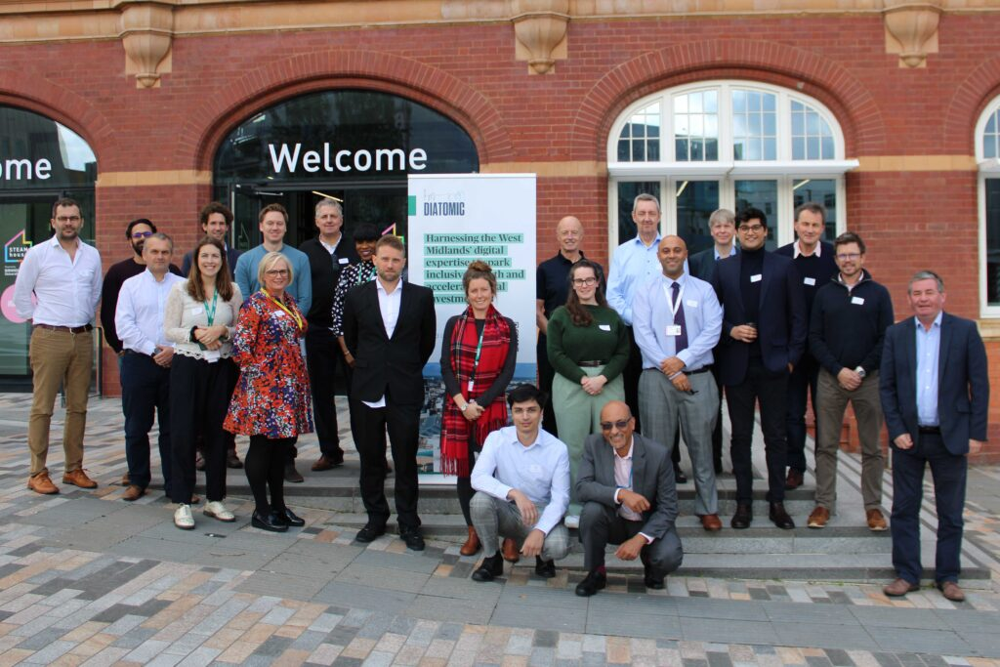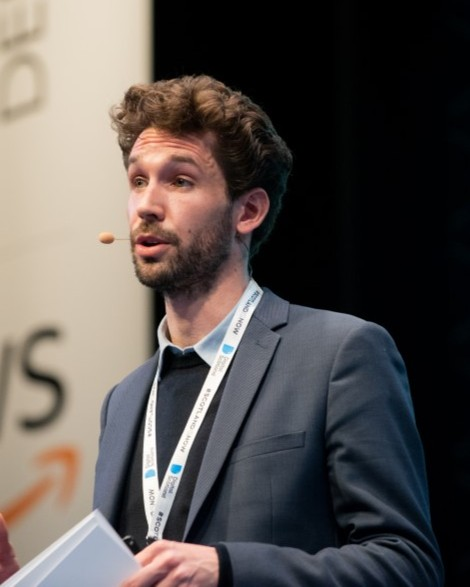How a £100k digital accelerator offer aligns with the uk’s modern industrial strategy – and why acting before 31 august 2025 could put your company at the heart of national growth plans
A Digital Revolution Rooted in the West Midlands
Birmingham’s canal networks once powered the first Industrial Revolution; today, the West Midlands is again a proving ground – this time for a Digital Twin Revolution. Across Birmingham and Wolverhampton, virtual models of roads, buildings, and infrastructure are already steering traffic, guiding net-zero retrofits, and shaping new neighbourhoods1. This transformation is being driven by a close partnership between Connected Places Catapult (CPC) and the region’s civic and academic leaders – including Birmingham and Wolverhampton City Councils and a consortium of local universities – ensuring these high-tech pilots address real city needs. It also dovetails with the UK’s new Modern Industrial Strategy, which spotlights city-regions like the West Midlands as “engines of the modern economy” ripe for rapid growth.

Local innovators from the DIATOMIC Accelerator’s first cohort at STEAMhouse in Birmingham. Up to 10 new SMEs will join the next cohort to develop digital twin solutions for city challenges2.
The opportunity is enormous. If the West Midlands’ productivity can be raised to the national average, it would add on the order of £70–90 billion per year to the UK economy. The Government has committed major funding to help make this happen – from a £600 million Strategic Sites Accelerator for redeveloping brownfield land, to a goal of 1.5 million new homes, to £15.6 billion for transport upgrades in city regions. The DIATOMIC Digital Accelerator is the on-the-ground delivery engine ensuring those big investments translate into real improvements in our cities. In its first phase (2023–25), 36 SMEs piloted twin-enabled services through DIATOMIC, collectively unlocking £23 million in co-investment so far. Now a fresh £100k fund is open for the next cohort (applications close 31 August 2025). Regional leaders are enthusiastic about what’s next: “The West Midlands is filled with innovative companies… Both these areas (Birmingham and Wolverhampton) have huge potential – together they’re forecast to stimulate tens of thousands of jobs,” notes Alan Welby, CPC’s Managing Director for Local Growth. In short, DIATOMIC is positioning West Midlands innovators to drive the UK’s modern industrial era, with City Council and university partners providing the data, testbeds, and community connections to root these projects in real city challenges.
Riding the Wave of National Investment
Each of DIATOMIC’s challenge areas maps directly onto a priority in the Modern Industrial Strategy. By targeting these areas, local SMEs can “ride the wave” of new public investment where government is actively pouring in funding. In practical terms, that means solutions piloted in DIATOMIC are primed for rapid scale-up as national programs roll out. For example:
- Smarter Transport & Clean Air: The government’s new multi-billion Transport for City Regions fund aims to unclog urban congestion and improve air quality. Birmingham is already using a city-wide mobility digital twin (fed by 300+ road sensors) to test “what-if” traffic signal plans virtually. This approach paid off: since launching a Clean Air Zone in 2021, Birmingham’s data-guided traffic tweaks helped cut roadside NO₂ by ~17% and halved the number of the most polluting vehicles entering the city centre. Global benchmarks echo these gains – Chattanooga’s city traffic twin improved traffic flow by up to 30%, and Shanghai’s municipal twin reduced commuter congestion ~20%. DIATOMIC invites SMEs to build on this momentum. A startup that can model traffic or public transport scenarios stands to amplify the impact of the £15.6 billion transport funding by ensuring every new bus route or cycle lane is optimised in software before it’s built. If your solution eases congestion or emissions, you’ll be plugging into a well-funded national mission for cleaner, connected cities.
- Housing & Land Development: The Strategy pledges to “build 1.5 million new homes” and fast-track major projects like HS2, which alone is expected to unlock 41,000 new homes in the region. There’s also a £600 million pot to accelerate bringing brownfield sites to market. DIATOMIC challenges in Birmingham and Wolverhampton directly align with this. One challenge is deploying AI-driven planning twins in Wolverhampton’s Green Innovation Corridor to speed up decisions on where those 9,300 planned new homes can go. A digital twin that instantly shows the impact of a proposed development on traffic, air quality, or utilities could shave months off the planning cycle, helping meet housing targets faster. Likewise, in Birmingham’s Knowledge Quarter, innovators are sought to create an underground infrastructure “X-ray” twin – essentially mapping hidden pipes and cables – to de-risk construction on tricky brownfield plots. This directly supports the Strategic Sites Accelerator: a twin that prevents costly utility surprises ensures those redevelopment funds are spent wisely. An SME that proves it can save time or money on site prep will be primed for public contracts as the brownfield revival ramps up.
- Energy Efficiency & Net-Zero: A new £500 million fund for local net-zero projects is coming on stream, and planning reforms are accelerating builds of energy-hungry facilities (from gigafactories to labs). This creates demand for solutions to optimise building performance and retrofit housing at scale. DIATOMIC has already demonstrated what’s possible here. Novoville, for instance, co-developed a retrofit coordination twin with Birmingham City Council to manage home insulation and heat-pump installations. After proving the concept, they secured a six-figure contract with the council to help upgrade hundreds of homes. “If it weren’t for DIATOMIC, our deal wouldn’t have happened,” says Novoville’s co-founder Louis Daillencourt, crediting the accelerator for the connection and pilot that led to the win3 . Another SME, Osmium, started out monitoring wind turbines but through DIATOMIC pivoted into smart building management. They developed a sensor system to track energy use and even humidity in council housing, which not only helped pinpoint properties at risk of mould but also positioned them to address the broader market need for energy monitoring in homes4. For innovators in prop-tech and cleantech, these examples show how aligning with the net-zero agenda can open doors: a pilot that demonstrates lower energy bills or carbon savings in Birmingham today can attract backing to scale across the UK’s 28 million buildings tomorrow.
In all these areas, the formula is clear: local pilot now, national rollout next. By solving a pressing city problem – whether it’s traffic jams, housing delays, or energy waste – you’re also creating a template that government and industry are actively looking to fund and replicate. DIATOMIC plugs you directly into these big missions, so a breakthrough on West Midlands streets can quickly become part of a £90 billion productivity upswing nationwide.
Turning Pilots into Big Deals: Local Success Stories
Perhaps the most compelling reason to join DIATOMIC is the track record of small, relatively unknown SMEs that have turned their city pilots into major opportunities. These first movers prove that you don’t need to be a giant tech firm to ride the digital twin wave – with the right support, even a three-person startup can punch above its weight. Here are a few real examples:
- Novoville – From Pilot to Procurement: Who says public sector deals take years? Novoville, a civic engagement platform, used DIATOMIC to develop “Shared Works,” a digital twin platform for coordinating housing retrofits. They spent the accelerator’s first months in “listening mode,” working closely with Birmingham’s retrofit team to tailor the product. The result was a 3-month pilot integrating real council data and contractor workflows. It went so well that Birmingham City Council decided to procure Novoville’s solution immediately after the trial5. “We co-built a service through the programme with the council, which led to a pilot and them procuring our product… That connection and a six-figure contract were made through DIATOMIC. It’s been transformative for our business,” says co-founder Louis Daillencourt. The accelerator also introduced Novoville to industry partners like Dodd Group (a national contractor), who went on to trial Shared Works on hundreds of housing association properties, validating its scalability6. In Louis’s words, DIATOMIC wasn’t just another demo day – it “led to a contract” and an ongoing deployment embedded in the council’s operations. For a lean startup, that kind of fast-track from concept to paid deployment is priceless.

Louis Daillencourt, co-founder of Novoville, secured a major contract with Birmingham City Council after piloting his retrofit management platform through DIATOMIC. He emphasises listening to end-users as key: “If you don’t take time to truly understand the obstacles… you’re not likely to succeed.”
- NolijWork – Analytics Opens New Doors: Birmingham-based NolijWork is an early-stage software startup that might never have gotten on a large council’s radar – until DIATOMIC gave them a chance. NolijWork created a “service diagnostic” digital twin to analyse and visualise operations (initially focusing on social housing maintenance). Through the accelerator, they trialled it on 60,000 council homes in Birmingham, crunching data on repair work to spot patterns and inefficiencies7. The pilot proved the value of an “MRI scan for your services,” as founder Paul O’Neill describes it – revealing bottlenecks in housing repairs that, once fixed, could cut weeks off the turnaround time for vacant units. Off the back of this success, NolijWork quickly entered discussions with potential clients from Scotland to the south coast of England, turning a local experiment into a nationwide opportunity. “The beautiful thing about DIATOMIC is how it connects large organisations with specialist companies who have new solutions that haven’t been tried before. It really gave us an opportunity with Birmingham City Council, whom we couldn’t have hoped to get an audience with otherwise. As a small organisation, it can be difficult to get anyone’s attention,” Paul says. In short, DIATOMIC opened doors that were firmly shut – giving NolijWork the credibility of a successful city pilot, and even leading them to apply their tool in new domains like adult social care monitoring at the council.
- Furbnow – Traditional Service to Tech Startup: Not all DIATOMIC stars began as “deep tech.” Furbnow started as a home retrofit concierge service – basically, a consultancy helping homeowners navigate insulation and heat pump installs. They joined DIATOMIC to scale that know-how into a data-driven platform. With support from the accelerator, Furbnow built a digital twin for retrofit planning that can serve not just individual homeowners but entire housing portfolios. This shift paid off: the team secured a trial with Birmingham City Council’s Route to Net Zero team to assist homes that don’t qualify for grants8 , and the exposure from DIATOMIC helped them get on the radar of social housing providers looking to upgrade thousands of homes. In fact, by 2024 Furbnow attracted £950k in pre-seed investment to expand its platform – a strong signal of market confidence. “Everyone deserves a warm, comfortable home without costly bills… We’re building Furbnow to be the go-to platform for homeowners who want advice and support as they plan and install low-carbon technologies and energy efficiency,” says co-founder Becky Lane. Thanks to the accelerator, Furbnow is now partnering with councils and housing associations, turning its on-paper expertise into a scalable software tool for the mass retrofit market. The lesson here is clear: even a non-software SME can transform into a cleantech innovator when barriers to entry (like access to data and pilot customers) are removed.
- Osmium – Pivoting with Real-World Insight: Another success story is Osmium, which highlights the value of experimentation in a real environment. Osmium manufactures IoT-enabled circuit boards for monitoring assets. They entered DIATOMIC focusing on building energy use in council facilities (a pivot from their original wind turbine niche). During the programme, Osmium not only evaluated the cost-effectiveness of various building retrofits, but also started tracking humidity in properties to predict mould risk – a pressing issue for social landlords. By deploying hardware in actual buildings, they uncovered practical challenges (like connectivity interference when too many devices are colocated) and solved them. “DIATOMIC gave us the chance to try our technology in a real setting, and the programme had a couple of really good coaches who offered valuable advice to help us develop our capabilities,” says director Graham Hygate. The experience even prompted Osmium to broaden its services (e.g. identifying fuel-poor households from energy data). In Graham’s words, the accelerator “forced us to get serious” about the new market and refine our solution for it. Now Osmium is poised to help tackle the UK housing sector’s urgent need for energy efficiency, with a proven pilot under its belt and a clearer product-market fit. It’s a testament to DIATOMIC’s ability to de-risk bold pivots – turning a tentative idea into a validated solution in just months.
These stories all share a common theme: first-mover advantage. By engaging early in the West Midlands’ digital twin initiatives, these SMEs have secured reference projects, press coverage, investor interest, and pipeline clients ahead of the competition. And they’re not outliers. In DIATOMIC’s first cohort alone, nine companies secured 30 new collaborations with external organisations and raised over £400k in additional funding by the end of the programme. The playing field with large incumbents is being levelled. “As a small company, getting that attention is priceless,” says NolijWork’s founder of the platform DIATOMIC provided. In other words, if you have an innovation that could improve how cities work – however small your team – this accelerator gives you a stage to prove it and a springboard to scale it.
What £100k and a City Testbed Can Do for You
For an SME, £100k of support plus a live city testbed can be truly transformative. DIATOMIC’s offer isn’t just cash – it’s an accelerated pathway to develop, deploy, and validate your solution in a real urban environment. Here are four key benefits of the programme:
- Build a working pilot fast – without draining your capital. Each selected company will receive funding (expected around £10k–£20k per pilot) to develop and deploy a prototype in Birmingham or Wolverhampton9. This means you can go from concept to a live demonstration in a matter of months, without exhausting your own runway. Importantly, you’ll be building on a state-of-the-art digital infrastructure provided by CPC. The DIATOMIC platform is a cloud-based Azure Digital Twin environment pre-loaded with live city data streams (traffic, air quality, energy, IoT sensors, 3D maps). CPC’s experts have essentially done the heavy lifting so a small team “can plug in and test an idea on Monday, and demo it using real data by Friday.” You don’t need to build a smart city platform from scratch – you can focus on your application and let the existing data backbone do the rest. The bottom line: you’ll develop in weeks what might otherwise take you many months and tens of thousands of pounds to attempt on your own.
- De-risk your idea and attract investors. Nothing validates a solution better than a successful real-world pilot. By piloting in partnership with a major city and its stakeholders, you gain instant credibility. You’ll have performance metrics, user feedback, and maybe even letters of intent from the pilot host. DIATOMIC’s first cohorts have already unlocked £23 million in follow-on co-investment after their pilots. Investors are far more willing to back a technology that’s been proven in the field, with paying (or soon-to-be-paying) customers lined up. In fact, going through DIATOMIC can turn doubters into believers: “It really gave us an opportunity with [the council] we couldn’t have hoped to get otherwise,” as NolijWork’s founder put it, emphasizing how that validation opened new client discussions. The programme also deliberately positions your pilot in areas of high public sector spend (housing, transport, etc.), which means a successful demo can pave the way to winning funded contracts or grants aligned with those big budgets. Novoville’s journey from pilot to procurement is a case in point. In short, DIATOMIC helps de-risk your innovation in the eyes of both customers and investors by providing a sandbox to prove its value.
- Access mentors, experts and a built-in network. When you join DIATOMIC, you’re not doing this alone. The accelerator provides wrap-around support from a team of experts in technology, business, and public procurement. You’ll have technical advisors to help integrate your solution with the digital twin platform and refine your algorithms, and business coaches to guide your pricing, IP strategy, and investor pitches. Past participants frequently praise the mentorship: “the programme had a couple of really good coaches which offered valuable advice” notes Osmium’s director, who credits them with helping develop new capabilities. Moreover, DIATOMIC is co-delivered with local authorities and universities, meaning you get direct access to city decision-makers and data owners. Need traffic data or GIS maps? Looking to run a trial on a specific street or building? The partners (City Councils, University of Birmingham, Birmingham City University, Aston University, University of Wolverhampton, etc.) are literally at the table to open doors. This kind of network can take years to build on your own – but the accelerator plugs you in from day one. As Catherine Hadfield of CPC puts it, the cohort gets to “test and demonstrate their technology in a real-world setting, which is crucial in helping them to grow”. Plus, you’ll be alongside up to 9 other innovative SMEs, generating peer support (and potential partnerships) that often last beyond the programme.
- Leap ahead of the competition as a first mover. The field of digital twins and smart city tech is still emerging – which means there’s a huge advantage to being first to market with a proven solution. By the end of the six-month accelerator, you could be one of only a handful of companies that have actual case studies in a given domain. That can make all the difference when bidding for future contracts or pitching to enterprise customers. You’ll be able to say, “We already did this in Birmingham, here are the results,” while others are still talking about theoretical benefits. Being a DIATOMIC alum also raises your profile: the programme is high-visibility, with coverage on platforms like the Digital Twin Hub and events like Birmingham Tech Week and Smart City Expo10. Several cohort companies have been invited to speak at industry conferences or join follow-on accelerators and opportunities (e.g. some are now eyeing international projects in places like South Korea through CPC’s global strand). In short, participating gives you a 6-12 month head start in a fast-growing market. In tech, that kind of lead can be game-changing. As one founder observed, “DIATOMIC basically opened the door to a client we couldn’t have reached otherwise…getting that attention is priceless.” Secure that first-mover status now, and you’ll set the benchmark that others have to chase.
Timeline & How to Apply
Time is short – but the opportunity is huge. If you’re interested in joining the next DIATOMIC cohort, mark these key dates:
- 31 August 2025 (Deadline): Final deadline to submit your application (via the Connected Places Catapult website). All proposals must be in by midnight on this date to be considered. Don’t miss this cutoff!
- Early/Mid-September 2025: Shortlisting and interviews. The DIATOMIC team will review submissions and invite promising candidates to a pitch or interview (likely held virtually). This is your chance to elaborate on your idea and demonstrate fit with the challenge areas.
- 25 September 2025: Cohort announced. Up to 10 SMEs will be selected and notified as the next DIATOMIC cohort. Whether you’re selected or not, you’ll be informed around this time.
- 8 October 2025 – March 2026: Six-month accelerator programme runs. This is the core of DIATOMIC Phase 2. Over these six months, each company will receive grant funding (the total pot is £100k, to be split among the pilots) and tailored support including mentorship, expert workshops, and regular check-ins. You’ll spend the first few weeks refining your solution design with guidance from experts and data from the digital twin platform. Then, you’ll build or integrate your prototype, with opportunities to test early and often. By early 2026, at least five of the cohort are expected to advance to on-the-ground trials in Birmingham or Wolverhampton – meaning your project could be deployed in a real neighbourhood or city infrastructure as a demo. A final Demo Day or showcase event will cap off the programme, where you can present your results to regional stakeholders, potential customers, and investors.
Throughout the application and programme, support is available. In fact, an application support webinar was held on 29 July 2025 – if you missed it, you can access the recording, slides, and FAQs on the programme’s webpage (look for the DIATOMIC Digital Accelerator page on CPC’s site, under “Open Calls”). The organisers are very approachable: for any last-minute questions, you can email diatomic@cp.catapult.org.uk (Program Manager Agathe Parois) and the team will be happy to help. Also, be sure to download the full Challenge Brief and Guidance from the official opportunity page – it details the six specific challenge themes (from Mobility & “Last Mile” travel in the Birmingham Knowledge Quarter, to Digital Planning in Wolverhampton, and more). Aligning your proposal to these outlined challenges will strengthen your application. Remember, your solution should ideally be at least TRL 4+ (tested in lab or small real environment) and you should be West Midlands-based to qualify. All the eligibility criteria are on the site, so double-check that you meet them, then put your best idea forward.
Bottom line: The sooner you act, the sooner your SME can start benefiting. As one founder put it, “When you get it right, innovation is fun and rewarding… When you create something that adds value and start getting that positive feedback, it’s an amazing feeling.” DIATOMIC is designed to get you to that point faster – so take the first step by applying before the deadline.
Don’t Miss the Revolution – Align Your Growth with National Priorities
The UK’s Modern Industrial Strategy calls city-regions “engines of the modern economy,” and the West Midlands is clearly revving up as one of those engines. Billions of pounds are flowing into new homes, cleaner transport, and smarter infrastructure – but it’s innovative SMEs on the ground that will ensure this investment truly delivers results. “Data-driven technology is the connective tissue of modern places – it’s what will enable the UK’s big missions to actually deliver results,” says Nury Moreira, CPC’s Consultant for Data & Digital. By innovating through DIATOMIC, your company can become that connective tissue, helping to turn lofty policy goals into tangible improvements in people’s daily lives.
The beauty of the DIATOMIC approach is that it’s simultaneously local and scalable. You’ll be solving problems for Birmingham and Wolverhampton communities – making streets safer, homes more efficient, journeys smoother – and creating a solution that can scale across the country as cities from London to Leeds pursue the same objectives. As CPC’s Enterprise Innovation Director Alex Weedon observed, “It is tremendous to see the DIATOMIC programme make a real impact for companies… The accelerator aims to demonstrate how new technology can make a real difference to people’s lives and to the operations of local authority clients.” In other words, this is impact with a business case: you’re not doing innovation for innovation’s sake, but to deliver measurable benefits that customers (like councils, utilities, or developers) are actively seeking.
The window of opportunity is open right now. The West Midlands is gearing up for a golden era of growth, with digital twin technology emerging as a key enabler. If you have a bold idea to improve housing, transport, energy, or city services, now is the time to act. The £100k on offer is just the spark; the real prize is becoming an integral part of a multi-billion pound transformation of our urban environments. Think of DIATOMIC as your springboard – with the funding, data, and network you need to leap forward, and a safety net of mentorship and support beneath you.
So, ask yourself the £100k question: Can my SME afford to sit out the digital twin revolution? For many, the answer will be no – not if you want to lead in the modern industrial era. Apply by 31 August 2025 to the DIATOMIC Digital Accelerator and seize the chance to turn your concept into a city-changing reality. Birmingham and Wolverhampton are ready to be your innovation playground, and the UK is watching for the solutions that emerge. This is your moment to shine, solve a real problem, and scale up with the wind of national policy at your back. The next industrial revolution is digital, it’s twin-enabled, and it’s happening here in the West Midlands. Don’t let it leave you behind. Apply today, and put your SME at the heart of building the future.
- https://digitaltwinhub.co.uk/digital-twins-west-midlands/ ↩︎
- https://cp.catapult.org.uk/news/west-midlands-tech-innovators-selected-to-help-improve-public-services ↩︎
- https://cp.catapult.org.uk/article/birmingham-accelerator-leads-software-firm-to-contract-win ↩︎
- https://www.ipec.org.uk/news/diatomic-delivers-results-for-innovators-in-birmingham/ ↩︎
- https://digitaltwinhub.co.uk/digital-twins-west-midlands/ ↩︎
- https://sharedrepairs.novoville.com/pages/post?id=35 ↩︎
- https://www.ipec.org.uk/news/diatomic-delivers-results-for-innovators-in-birmingham/ ↩︎
- https://smebusinessreview.com/clean-energy/furbnow-raises-ps950k-funding-to-decarbonise-one-million-homes-by-2030 ↩︎
- https://iuk-business-connect.org.uk/opportunities/diatomic-digital-accelerator-for-west-midlands-based-innovators/ ↩︎
- https://distinctlybirmingham.com/strategic-projects/diatomic/ ↩︎



Leave a comment